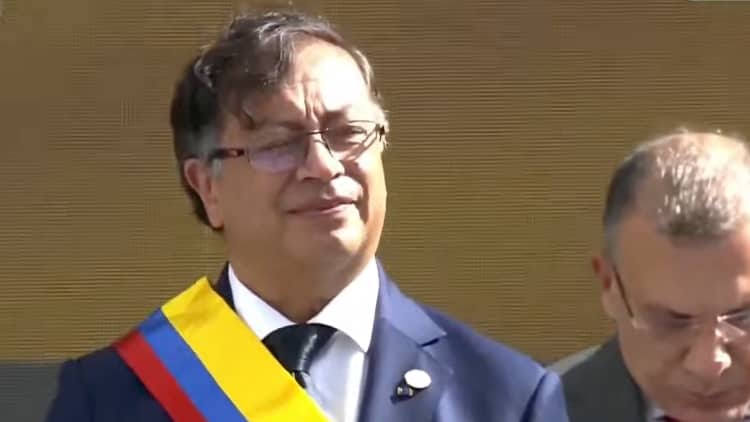The Diplomat
Gustavo Petro is now president of Colombia. In front of a dozen heads of state, including King Philip VI, the country’s first left-wing president was sworn in yesterday in front of a crowd of 15,000 people, according to official sources, gathered in Bogotá’s Plaza de Bolívar.
Petro, in front of a capacity crowd, asked as soon as he took the oath of office that the sword of Simón Bolívar be brought to him, which his predecessor, Iván Duque, had refused, citing security reasons. As a result, the ceremony had a ten-minute break until the relic arrived.
The new president’s speech focused on the violence, inequality and poverty in the country. To confront these ills, he called on armed groups to disarm, reminded them that peace is possible, called for solidarity with those most in need, and stated the need to “make Colombia more egalitarian and with more opportunities for all”.
In addition to King Felipe VI, who travelled accompanied by the Minister of Foreign Affairs, José Manuel Albares, the ceremony was attended by the presidents of Honduras, Xiomara Castro; Argentina, Alberto Fernández; Paraguay, Mario Abdo Benítez; Ecuador, Guillermo Lasso; Costa Rica, Rodrigo Chaves; Chile, Gabriel Boric; Bolivia, Luis Arce; and the Dominican Republic, Luis Abinader.
Before the transfer of power, the King held meetings with the outgoing President of Colombia, Iván Duque, and with Petro himself, as well as with the Ecuadorian President, Guillermo Lasso. He also took advantage of his presence in the Colombian capital to meet with the Spanish community in Bogotá.
His attendance at Petro’s inauguration “reaffirms Spain’s desire to continue strengthening the solid ties of friendship that unite the two nations, accompanied by shared values that benefit our citizens”, the Spanish Ministry of Foreign Affairs said in a statement.
Colombia’s new president arrives at the Casa de Nariño with public opinion completely in his favour. His popularity among Colombians stands at 62%, while that of his predecessor, Iván Duque, plummets to 33%. The figures give him even more backing when it comes to the reforms he has put forward during his campaign. Eighty-four per cent of Colombians agree with his proposals, including health care reform, reducing unemployment (currently at 11 per cent) and restoring relations with Venezuela.
However, many political scientists believe that these expectations could work both for and against Petro, as the hope with which a large part of the population welcomes the arrival of the first left-wing president could lead to great disappointment if many of his plans for the presidency are not fulfilled.
For the moment, Petro has tried to send messages of calm to the opposition and, above all, to the markets. In this sense, the appointment of José Antonio Ocampo, a prestigious economist who has worked in different positions in the governments of Samper, Gaviria and Santos, as Minister of Economy, is a sign of the conciliatory mood that Petro wants to show as soon as he takes office.
Gustavo Francisco Petro Urrego is an economist and founder of the Colombia Humana party, as well as leader of the political coalition Pacto Histórico. A former guerrilla militant of the 19 April Movement (M-19), he was first elected to the House of Representatives under the acronym of the Democratic Alliance M-19, the political successor of the M-19.
In 2006 he was elected senator for the Polo Democrático Alternativo (PDA), a position he resigned in 2009 to run for the Colombian presidency in the 2010 elections. He ran again in 2018.
Last March he was again elected presidential candidate of the Pacto Histórico coalition. Petro won the election in the second round with more than eleven million votes (50.44%), making him the presidential candidate with the highest number of votes in the history of Colombia.





